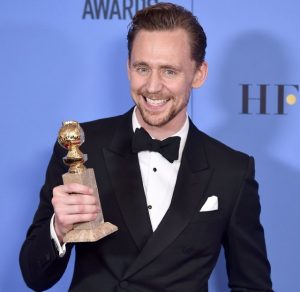award shows, celebrity interviews, Golden Globe Awards, Golden Globe interviews, Golden Globes, The Night Manager, Tom Hiddleston, TV
January 9, 2017
by Carla Hay
The 74th annual Golden Globe Awards took place on January 8, 2017, at the Beverly Hilton in Beverly Hills, California.
TOM HIDDLESTON
Golden Globe win:
Best Actor in a Mini-Series or Television Film
Here is what this Golden Globe winner said backstage in the Golden Globe Awards press room.

BACKSTAGE INTERVIEW
You filmed “The Night Manager” and “Thor: Ragnarok” in Australia. Do you pinch yourself knowing that you have these very different acting roles?
I do. I feel very lucky. When I became an actor, I wanted to move between genres and characters and never repeat myself or play the same thing twice. I have played Loki four times, but the idea that I’m allowed to play both Jonathan Pine and Loki and my character in “Kong: Skull Island,” which I was also in Australia for is truly everything I’ve always wished for is an actor, so I feel immensely fortunate.
How were you challenged in your “Night Manager” role? Did you feel you were challenged differently from your past roles?
Certainly. If you read the novel by John le Carré, it’s such a rich resource. And quite apart from being a master storyteller of espionage thrillers, John le Carré is it is a very curious student of British identity. And I think through Jonathan Pine, he’s trying to get underneath the skin of what it means to be English, how Englishness changes when were abroad, how it changes when we fight for our country, because Jonathan Pine is a former soldier, and also how it manifests in the character of Richard Roper who is an arms dealer to whom people are very drawn because Richard Roper is attractive and charismatic in and you like him, but he is deeply cynical. And I think that le Carré’s anger is that a man like Roper is an inheritor of the freedoms of British democracy but has chosen to the worst things imaginable.
With Pine, the challenge is he’s a spy. And spies dissemble and conceal and they have to be believable as they lie. And the nature of acting is always exploring identity but Pine is four different people he has to be believable in all his different guises. And that was fascinating for me to play different people with different names were different passports. So very different very new and very exciting.
At the beginning of the series, Pine is a night manager. How did “The Night Manager” director Susanne Bier talk to you about that character when we meet him at first?
Susanne and I talked a lot about uniform. Pine is a former soldier in our adaptation of the second Iraq War in 2003. And he has for reasons, perhaps known only to himself, hidden behind another uniform. He’s someone who feels comfortable behind the anonymity of service he was in military service now he’s in hotel service immensely capable, practical and resourceful.
And I think in the first episode he commits he put his heart on the line and he’s broken-hearted. And that is the thing that challenges him to do something to come out behind the uniform and stand up for something more. And I had a fascinating time. I did a night as a night manager at the Rosewood Hotel in London. And it’s all theater.
Staying in hotels since then has been a different experience because everything is immaculately managed to make the guests feel welcome. Of course, if you’re doing it well, they don’t see the work, which is very like acting. But yeah that we talked about service and putting other people before yourself because that’s what the uniform demands.
You’re so good at playing the bad guy now. When you read the script do you ever feel bad? How is it to be the bad guy?
I haven’t played the bad guy for a while. I just finished “Thor Ragnarok” in which I’m Loki again, but mercifully the bad boy pants who passed on to Cate Blanchett this time around who’s playing the goddess of death, which is significantly more bad than the god of mischief, I think in the bad-boy stakes. I do think about what the film is transmitting about people and about character and recently I’ve played people who might be construed as protagonist, as opposed to antagonists.
But with Loki, specifically, who’s the most out-and-out villain I’ve played, it always try to see to be compassionate to his point of view, and that’s how I think you get an honest performance. But I understand that at the end of Avengers he has to get Hulk-Smashed, and he has to go down.
There is a photo of you and Carrie Fisher at the White House Correspondents Dinner. How did you feel when she passed away?
Carrie Fisher was such a fighter, and I spent one evening with her in Washington last summer at the White House Correspondents Dinner as a guest of The Guardian newspaper. And she had this indomitable spirit that was bigger than the occasion. She was such a force for life and I think if we could take anything a lesson from there it’s just it’s to live as fully as we can, to embrace our weaknesses and that very act makes them become strengths.
And she was so funny. She insisted that when we were there she was looking after her dog Gary, and I was looking after Gary’s rubber duck which was a rubber duck of Princess Leia. So I felt in the presence of the outgoing president of the United States, it was only appropriate that they have a Princess Leia rubber duck in train because of Carrie’s contribution.
